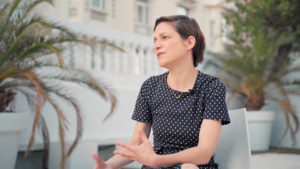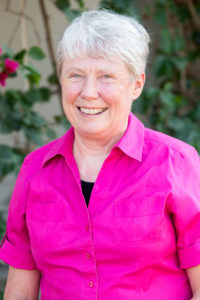Research shows that inventions arising out of mixed teams, or women only groups, have wider breadth and higher impact from a technological viewpoint than those in which only men are involved. Read our series of Q&As with some of the world’s leading women in the tech industry.
1. Grace Mutung’u, ICT policy expert
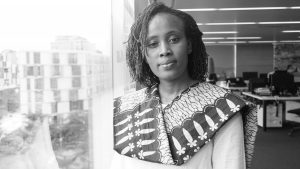
Grace Mutung’u is a researcher on ICT policy in Kenya. She has been involved in ICT policy development processes over the past 10 years and was a 2017 Open Technology Fund Senior fellow, studying elections in East Africa. She is a curator on Sub-Saharan Africa internet governance issues at the Geneva Internet Platform and an affiliate at the Kenya ICT Action Network. Watch her interview about digital identity, e-governance, data protection and creating a fairer internet.
2. Lorena Jaume Palasí, Executive Director of the Ethical Tech Society
Lorena Jaume-Palasí is Executive Director of the Ethical Tech Society. Based in Berlin, she co-founded the organisation AlgorithmWatch, which analyses the ethics of automation and digitalisation in the use of socially relevant algorithms. She also leads the secretariat of the Forum for Internet Governance (IGF) in Germany. Watch our interview on privacy issues, data ethics and algorithm accountability.
3. Saniye Gülser Corat, Director of the Division for Gender Equality at the Office of the Director-General, UNESCO
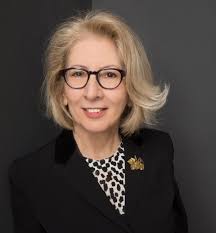
Saniye Gülser Corat is the Director of the Division for Gender Equality at the Office of the Director-General at UNESCO Headquarters in Paris, France. Read our interview where she shares her thoughts on the digital gender gap, gendered AI and pursuing equality worldwide.
4. Maria Klawe, computer scientist and president of Harvey Mudd College
Maria Margaret Klawe is a computer scientist and the fifth president of Harvey Mudd College, which has become a pioneer in terms of diversity. In just 12 years, she has managed to increase the percentage of girls who want to dedicate themselves to “Computer Science” from 10 to 40%. She was previously Dean of the School of Engineering and Applied Science at Princeton University. Read her interview here.
5. Mariagrazia Squicciarini, OECD Directorate for Science Technology and Innovation
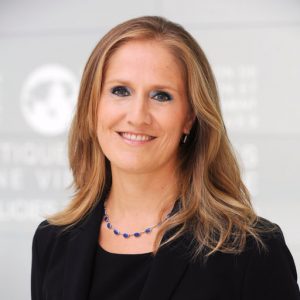
Dr. Mariagrazia Squicciarini is Senior Economist and Head of Unit within the Directorate for Science Technology and Innovation (STI) of the OECD. Among other activities, she is responsible for the Working Party on Industry Analysis (WPIA), which develops indicators and quantitative analysis related to the changing determinants of growth and productivity, Intellectual Property Rights (IPR), global value chains, jobs and skills in the digital transformation, as well as the digital gender divide. Read our full interview with her here.
6. Renata Ávila, Human Rights and technology lawyer

Renata Avila is a Human Rights and technology lawyer who works towards an agenda that guarantees the rights of internet users, prioritising countries in the southern hemisphere. She also acts as legal advisor in matters related to human rights under the guidance of Baltasar Garzón and is part of the team that defends Julian Assange. She believes that the best possible set of tools for our defence is Universal Human Rights. Read her interview.
7. Silvia Barrera, cybersecurity expert

Silvia Barrera is an Inspector of the National Spanish Police, specialised in cybersecurity and cyber crime investigation. She has directed international working groups at EUROPOL and INTERPOL in this field and has published several books on the topic. Read her interview.
8. Lisa Witter, Co-Founder and Executive Chairman of Apolitical
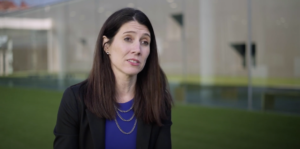
Lisa Witter is the Co-Founder and Executive Chairman of Apolitical: a network connecting public servants from around the world in order to share ideas, resources and solutions to shared challenges. Watch the full interview here.
9. Daria Tataj, world expert in Innovation and Network Thinking
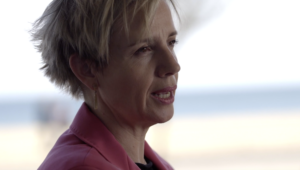 Dr. Daria Tataj is Founder & CEO of Tataj Innovation. She is one of the architects of the EIT (European Institute of Innovation & Technology) and EIC (European Innovation Council), two key funding institutions for entrepreneurship and disruptive innovation in Europe, as well as a mission-oriented policy approach. Daria held senior roles as a Chair of Advisors to EU Commissioner for Research, Science and Innovation and WEF’s Digital Leader in 2017. She founded Vital Voices Chapter in Poland and is currently an Advisory Board Member of two do-tanks: Re-Imagine Europa in Paris and Digital future Society in Barcelona. Watch her interview now.
Dr. Daria Tataj is Founder & CEO of Tataj Innovation. She is one of the architects of the EIT (European Institute of Innovation & Technology) and EIC (European Innovation Council), two key funding institutions for entrepreneurship and disruptive innovation in Europe, as well as a mission-oriented policy approach. Daria held senior roles as a Chair of Advisors to EU Commissioner for Research, Science and Innovation and WEF’s Digital Leader in 2017. She founded Vital Voices Chapter in Poland and is currently an Advisory Board Member of two do-tanks: Re-Imagine Europa in Paris and Digital future Society in Barcelona. Watch her interview now.
10. Mary Gray, Principal Researcher at Microsoft Research

Mary L. Gray is a Principal Researcher at Microsoft Research and Faculty Affiliate at Harvard University’s Berkman Klein Center for Internet and Society. She maintains a faculty position in the School of Informatics, Computing, and Engineering with affiliations in Anthropology, Gender Studies and the Media School at Indiana University. Watch her interview.

